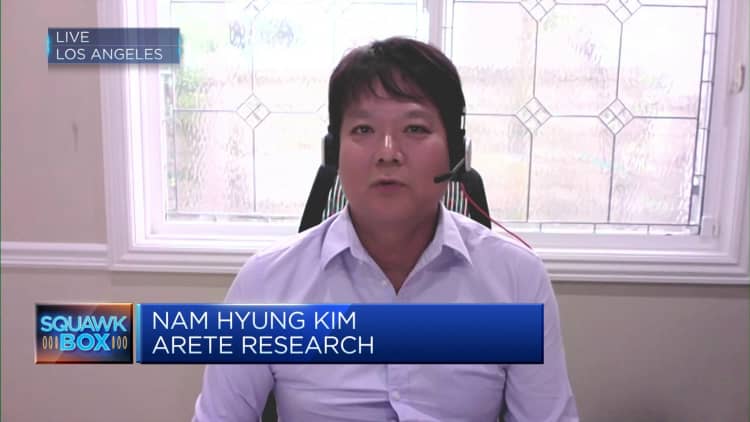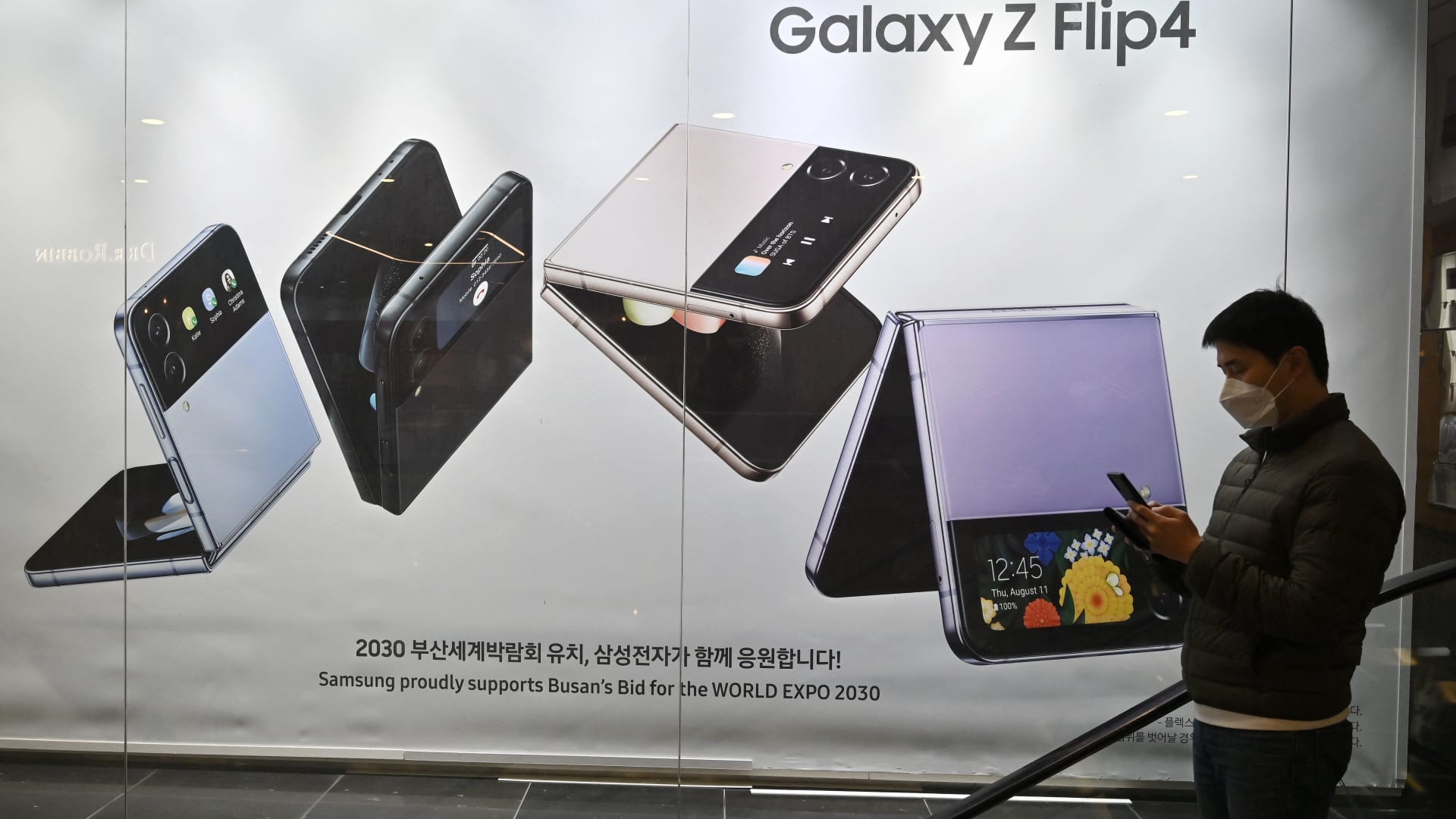Samsung Electronics said on Friday it would make a “meaningful” cut to chip production, following the lead of smaller rivals, as it grapples with a sharp global downturn in semiconductor demand that has sent prices plummeting.
The unusual output cut by the world’s biggest memory chipmaker — with no previous announcement recalled by Samsung officials and analysts — came after it flagged a worse-than-expected 96% plunge in first-quarter profit.
Investors brushed off the profit miss, betting the move by the industry leader would support chip prices that had fallen by about 70% over the last nine months.
Samsung jumped 4.5% in early trading in the biggest one-day rise since September, while rival SK Hynix’s shares surged 5.6%.
Smartphone and personal computer makers had stocked up on chips during the pandemic when demand for consumer devices surged, but they are now running down inventories as shoppers cut back on purchases amid rising inflation.
Samsung said memory demand had dropped sharply because of a weak global economy and customers slowing purchases as they focused on using up their stocks.
“We are lowering the production of memory chips by a meaningful level, especially that of products with supply secured,” it added, in a reference to those with sufficient inventories.
“The fact that the No. 1 market share firm is joining production cuts lifted shares... SK Hynix and Micron have declared production cuts, but only Samsung had not, so the market was watching for it,” said John Park, an analyst at Daishin Securities.
“Today’s production cut signal casts a positive outlook for a memory chip rebound in the second half of the year.”
Although cutting short-term production, Samsung said it was still making long-term investments in infrastructure and research to secure needed clean rooms for chip production and expand its technological lead.
It did not say how its 2023 investment plans would be affected, having previously flagged capital spending similar to the 53.1 trillion won investment in 2022.

Samsung may focus more on U.S. than China in terms of demand and supply: Analyst
SK Hynix said in October it would more than halve its capital spending in 2023 versus 2022, while Micron cut fiscal 2023 investment plans by more than 30% in September.
The first-quarter profit fell short of a 873 billion won Refinitiv SmartEstimate, weighted toward analysts who are more consistently accurate. Multiple estimates were revised down earlier this week.
Its chip division is likely to report a record loss of 2.1 trillion won ($1.6 billion), according to an average of analyst forecasts, and post another 2 trillion won loss in the current quarter, a major divergence for what had been Samsung’s most important cash cow, generating about half of its profits in better years.
Analysts said Samsung’s production cut might improve its performance slightly in the current quarter and could also cement or hasten the rebound of memory chip prices.
“Samsung talking about production cuts is evidence of how bad the current slump really is,” said Greg Roh, head of research at Hyundai Motor Securities.
The company is due to release detailed earnings, including divisional breakdowns, later this month.

 www.cnbc.com
www.cnbc.com
The unusual output cut by the world’s biggest memory chipmaker — with no previous announcement recalled by Samsung officials and analysts — came after it flagged a worse-than-expected 96% plunge in first-quarter profit.
Investors brushed off the profit miss, betting the move by the industry leader would support chip prices that had fallen by about 70% over the last nine months.
Samsung jumped 4.5% in early trading in the biggest one-day rise since September, while rival SK Hynix’s shares surged 5.6%.
Smartphone and personal computer makers had stocked up on chips during the pandemic when demand for consumer devices surged, but they are now running down inventories as shoppers cut back on purchases amid rising inflation.
Samsung said memory demand had dropped sharply because of a weak global economy and customers slowing purchases as they focused on using up their stocks.
“We are lowering the production of memory chips by a meaningful level, especially that of products with supply secured,” it added, in a reference to those with sufficient inventories.
Read more about tech and crypto from CNBC Pro
Samsung did not disclose the size of the planned production cut, but it sent a strong signal for a company that had previously said it would make small adjustments like pauses for refurbishing production lines but not a full-blown cut.“The fact that the No. 1 market share firm is joining production cuts lifted shares... SK Hynix and Micron have declared production cuts, but only Samsung had not, so the market was watching for it,” said John Park, an analyst at Daishin Securities.
“Today’s production cut signal casts a positive outlook for a memory chip rebound in the second half of the year.”
Although cutting short-term production, Samsung said it was still making long-term investments in infrastructure and research to secure needed clean rooms for chip production and expand its technological lead.
It did not say how its 2023 investment plans would be affected, having previously flagged capital spending similar to the 53.1 trillion won investment in 2022.

Samsung may focus more on U.S. than China in terms of demand and supply: Analyst
SK Hynix said in October it would more than halve its capital spending in 2023 versus 2022, while Micron cut fiscal 2023 investment plans by more than 30% in September.
Record chip loss
Samsung estimated its operating profit fell to 600 billion won ($455.5 million) in January-March, from 14.12 trillion won a year earlier, in a short preliminary earnings statement. It was the lowest profit for any quarter in 14 years.The first-quarter profit fell short of a 873 billion won Refinitiv SmartEstimate, weighted toward analysts who are more consistently accurate. Multiple estimates were revised down earlier this week.
Its chip division is likely to report a record loss of 2.1 trillion won ($1.6 billion), according to an average of analyst forecasts, and post another 2 trillion won loss in the current quarter, a major divergence for what had been Samsung’s most important cash cow, generating about half of its profits in better years.
Analysts said Samsung’s production cut might improve its performance slightly in the current quarter and could also cement or hasten the rebound of memory chip prices.
“Samsung talking about production cuts is evidence of how bad the current slump really is,” said Greg Roh, head of research at Hyundai Motor Securities.
The company is due to release detailed earnings, including divisional breakdowns, later this month.

Samsung Electronics to make 'meaningful' cut to chip production in effort to support prices
The figure was worse than analysts had forecast, as a chip glut worsened and buyers slowed purchases amid a global economic slowdown.

